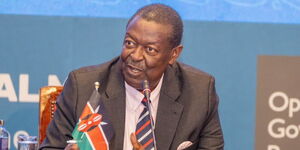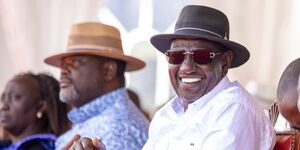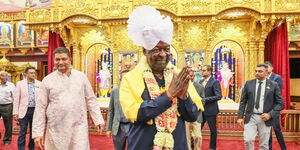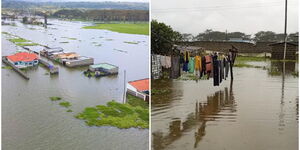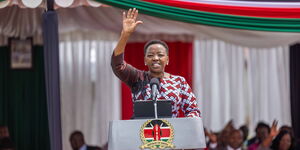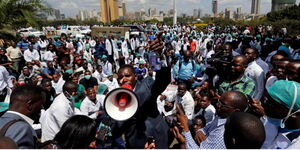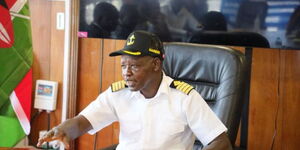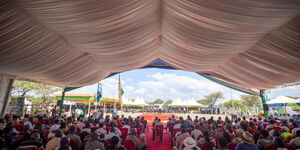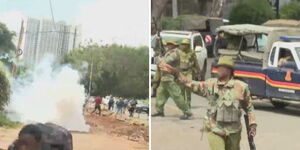The bilateral relations between China and Kenya date back to December 14, 1963, just two days after the formal establishment of Kenyan independence, China became the fourth country to open an embassy in Nairobi
It was during this period that China bid £6 million to woo Mzee Jomo Kenyatta to their corner, amid serious interest from Russia.
The Chinese had learned of some serious Russian investments and lavish promises set to be granted to Kenya and decided that going directly after the president, offered them the best chance at out-maneuvering the Russians.
In a bid to push out the Russians, China offered an immediate gift of £1,071,000 to help Kenya balance her shaky budget, the Financial Times reported at the time.
They also offered an interest-free loan of £5.3 million -with 'no conditions attached, part of which was given in equipment and technical assistance, including help from Chinese experts in Kenya, while the extra money was needed that to pay for the Kenya Army whose cost had been settled previously by the British taxpayers.
This totalled at £6,37100 million - The inflation rate in the United Kingdom between 1964 and today has been 1,637.31%, which translates into a total increase of £104,313,009.47. This means that £6,371,000 in 1964 are equivalent to 110,684,009.47 pounds in 2020. In other words, the purchasing power of £6,371,000 in 1964 equals £110,684,009.47 today.
At the current exchange rate, this figure amounts to around Ksh14.2 billion.
Mao Tse-tung's (the founding father of the People's Republic of China) bid for Mzee Jomo's favour outweighed that of Nikita Sergeyevich Khrushchev ( a Soviet statesman who led the Soviet Union during part of the Cold War as the first secretary of the Communist Party of the Soviet Union ), marking the begin of China's long-term relationship with the East African nation.
Not to be outdone, the Russians followed through on their promises, but instead of courting Mzee Jomo directly, they went through Jaramogi Oginga Odinga -the foreign affairs minister at the time.
Oginga secured aid programs following a successful trip to Moscow that led to Russia setting up a hospital for free, a technical college (which would be staffed and financed by Russian taxpayers for the first two years), as well as a radio station, two canning factories, a sugar factory, and a textile mill.
It's arguably the biggest referral and teaching facility in western Kenya to date, the Jaramogi Oginga Odinga Teaching and Referral Hospital embodies benefits that came from friendship and relations between Kenya and Russia.
It was named after Oginga as it was him who led an eight-member delegation to the Union of Soviet Socialist Republics (USSR) to negotiate funding for the facility.
The team included then-Foreign Affairs minister Joseph Murumbi and Agriculture minister at the time Munyua Waiyaki, who went on to secure full funding for the 240-bed capacity hospital.
It was officially opened to the public in a colourful ceremony presided over by Mzee Jomo Kenyatta and Health minister Joseph Daniel Otiende on October 25, 1969.
Flash forward to date and an interesting pattern emerges involving both China & Russia, and their interests in Kenya.
On its part China's investment in Kenya peaked between 2000 to 2011, when there were approximately 65 Chinese official development finance projects.
These projects ranged from a 108 million USD grant from the Chinese government to build the North and East Ring Road sections in Nairobi, to a concessional loan to finance the construction of the Kenyatta University Teaching, Research and Referral Hospital Project in 2011.
In 2018, Chinese Ambassador to Kenya Wu Peng announced that China's non-financial direct investment in Kenya stood at 520 million U.S. dollars
"Now we have over 400 Chinese companies in Kenya, creating thousands of jobs for the local community," he stated.
Russia, on the other hand, has rekindled their deeply rooted ties with Kenya. On October 24, 2019, Russia's President Vladimir Putin, pushed to bridge the trade imbalance that exists between Nairobi and Moscow.
"Last year it grew only a little, but it was still 1.2% growth. We are glad that several Russian companies have gained a foothold in the Kenyan market,” he stated, going on to encourage more Russian private sector players to invest in Kenya.
The renewed Russian interest was publicized as President Putin and his Kenyan counterpart Uhuru led their delegations during bilateral talks in Sochi, Russia.
It was agreed that the two nations would establish a Russia-Kenya business council that would oversee the implementation of joint trade and investment programs.
President Uhuru disclosed that Kenya was the second-largest trading partner of Russia in Africa, but that the full potential of the economic cooperation was yet to be achieved.
Russia was among the very first nations to establish diplomatic relations with Kenya, a point which President Putin re-emphasised during the meeting.
“First of all, I would like to note that the history of friendly ties between Russia and Kenya goes back to the day when Kenya gained independence, which was proclaimed by your father, former President Jomo Kenyatta.
“And a day later, diplomatic ties were established, on December 12 and December 14, 1963, accordingly,” Putin recalled.

